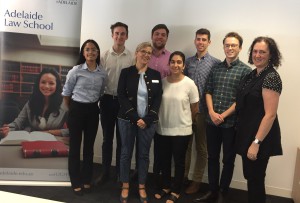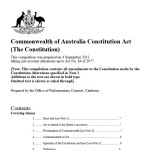The Adelaide Law School was proud to launch its fourth free legal advice service today, the Entrepreneur and Venture Advice Clinic. The clinic is housed within ThincLab, the University’s venture accelerator, and offers free, confidential advice to individuals, new start ups and small to medium enterprises (SMEs).
EVAC is staffed by fourth and final year students from the Adelaide Law School, with the support of the Adelaide law firm Cowell Clarke. Partner Megan Jongebloed and her team of solicitors, Anna Lacey, Katie Pote and Jasmin Shahin, will supervise the students during their meetings with clients and in the preparation and provision of advice.
According to the Director of EVAC, Dr Beth Nosworthy, “Data released by the Australian Bureau of Statistics on 20 February 2018 tells us that of the 2.2 million actively trading businesses in Australia at the end of 2016-2017, over 70% of the businesses with employees employed between 1 and 4 people, and 98% of businesses had an annual turnover of less than $2m. This indicates the depth of small and medium enterprises in our current economy, many of whom may not have sought legal advice when their business was being formed. In South Australia, we have a generally positive news story, with over 66% of businesses in operation in June 2013 continuing to do business at the end of 2016-2017. However, it is worth noting that the survival rate for the various business structures available in Australia varied quite widely, with sole traders having the highest rate of exit in 2016-2017 and the lowest rate of survival across all years surveyed to June 2017, despite having the greatest entry into the market in the last financial year. EVAC aims to provide individuals and businesses with advice to assist them in structural and strategic choices to put their business in the best position possible.”
EVAC can assist individuals or businesses on their choice of business structure; partnership, shareholder or security agreements; intellectual property; labour law issue; taxation; Commonwealth and state regulatory issues; and with general commercial advice.
Appointments can be booked online at the EVAC website, and enquiries can be made to evac@adelaide.edu.au. EVAC is also on twitter: @evadviceclinic .





